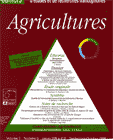Tolérance à l'acidité in vitro de rhizobia isolés de "Vigna unguiculata" au Cameroun en comparaison avec "Bradyrhizobium japonicum"
Résumé
In Cameroon, soils are generally acidic, i.e. pH 3.8-4 is common in the humid forest zone. In tropical areas, soil acidity is often responsible for low crop yields because of low nutrient availability and reduced soil microbial activity. Grain legumes such as cowpea (Vigna unguiculata (L.) Walp.) have a high nitrogen fixing ability in symbiosis with rhizobia present in soil. Effective cowpea rhizobia can fix more than 150 kg N/ha and contribute to 80-90% of plants' nitrogen requirements. Beneficial microorganisms have shown different degrees of adaptation to acid soils. In this in vitro study, acidity tolerance was compared in two rhizobial strains isolated from cowpea nodules in Cameroon (VUXY1 and VUID1) and one Bradyrhizobium japonicum strain (GMXC) from China, grown in liquid medium at pH 3-6. Rhizobial growth was monitored for 4 days using optic density (OD) measurements for growth kinetics and biomass after harvest. The results revealed that the growth medium pH had an important influence on rhizobial growth, the latter being very low at pH 3 (Figure 1). At pH 4, only the VUXY1 strain was able to grow. At pH 5, the two Cameroonian strains (VUXY1 and VUID1) were able to grow within the first 2 days. At pH 6, all strains showed active growth kinetics, but growth started only after 4 days for the Chinese strain (GMXC). After 4 days of growth, very low dry mass was observed at pH 3 for the three strains (Table 1). The optimum dry mass corresponded to pH 5 (highest value for the VUID1 strain), while the optimum level for the GMXC strain was above pH 6. In culture, the VUXY1 strain strongly acidified the medium, VUID1 was neutral and the GMXC strain strongly alkalinized it (Figure 2). These results suggest that Cameroonian rhizobial strains were better adapted to acidity than the B. japonicum strain. VUXY1 was the only strain able to grow at pH 4, which is particularly acid-tolerant; it also produced a considerable amount of acid when grown in culture media, in contrast to the general opinion that tropical rhizobia produce alkali to control acidity. Our findings also support the hypothesis that fast-growing rhizobia are more acid-tolerant than slow-growing Bradyrhizobium. It could be useful to select acid-tolerant rhizobia strains, but sensitivity to aluminium is an important additional factor which should be taken into consideration when growing acid-tolerant strains.Téléchargements
Publié
1998-09-01
Comment citer
Nwaga, D., & Ngo Nkot, L. . (1998). Tolérance à l’acidité in vitro de rhizobia isolés de "Vigna unguiculata" au Cameroun en comparaison avec "Bradyrhizobium japonicum". Cahiers Agricultures, 7(5), 407–410 (1). Consulté à l’adresse https://revues.cirad.fr/index.php/cahiers-agricultures/article/view/30118
Numéro
Rubrique
Articles

